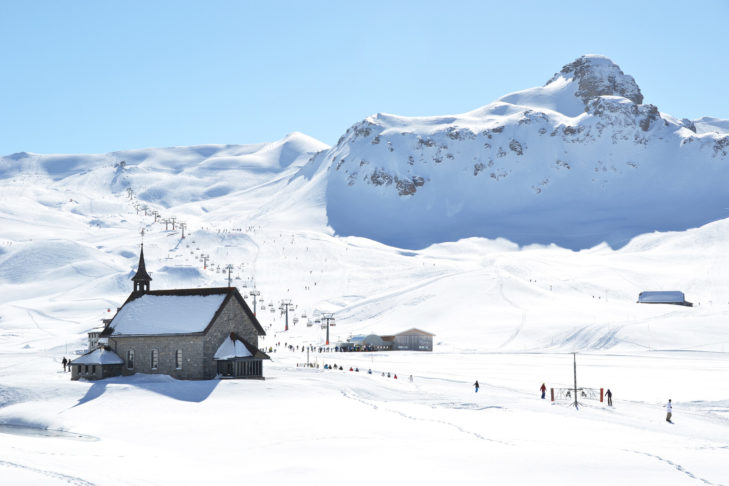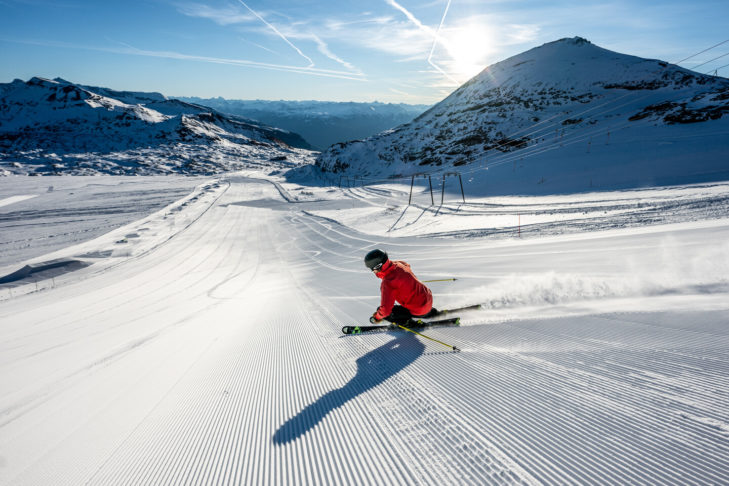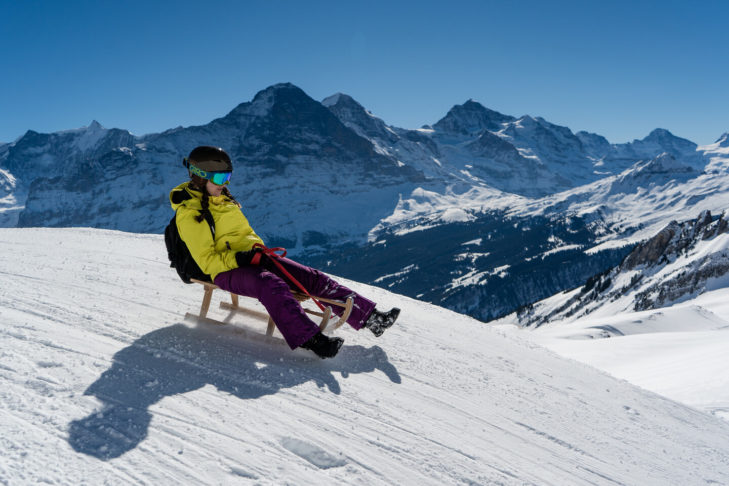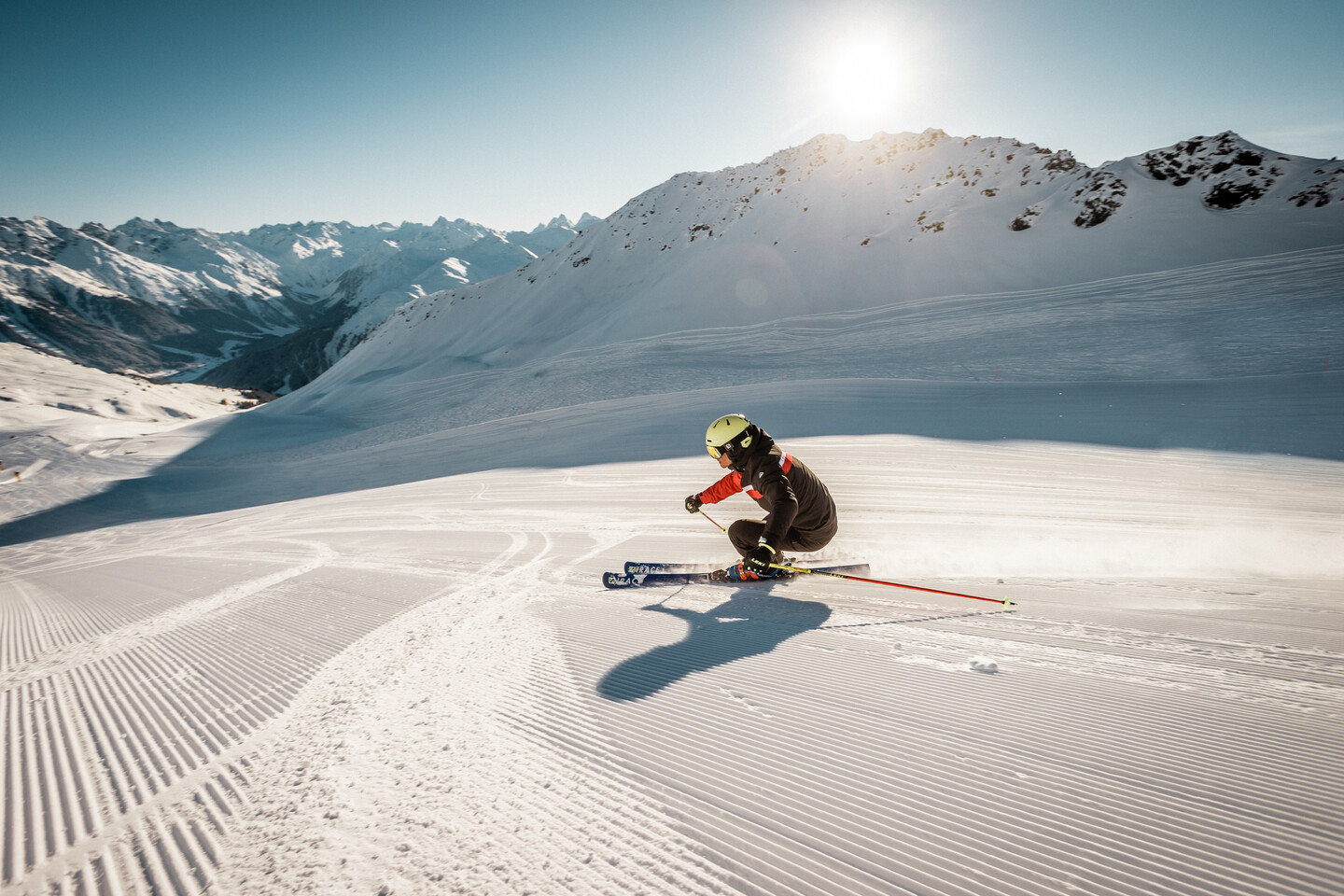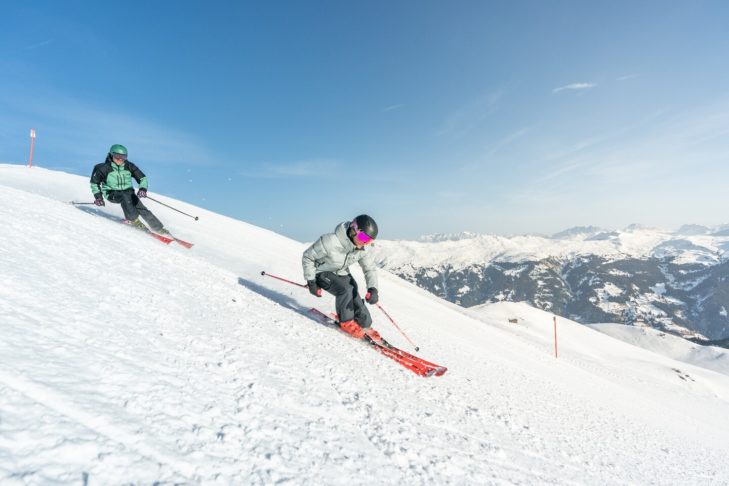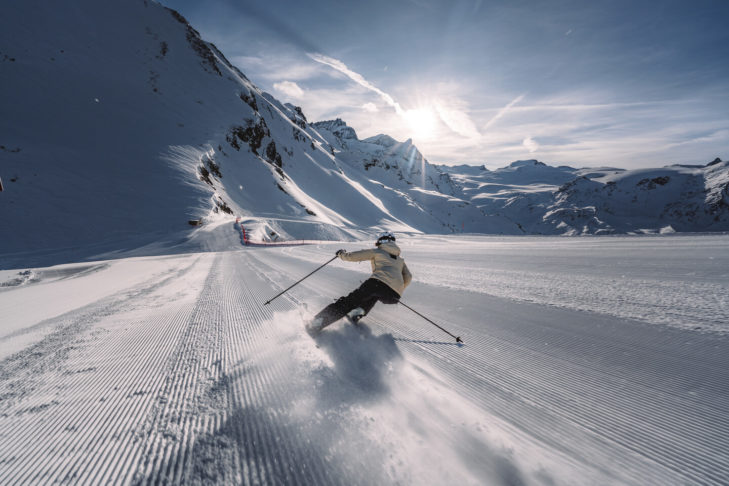No other Alpine country has as many mountains over 4,000 metres above sea level as Switzerland. The piste conditions in the ski resorts there are correspondingly impressive – usually from November to April. So there is plenty of time, even for the bargain hunters among winter sports enthusiasts, to make their way to the high mountains and enjoy the slopes. Because skiing doesn’t necessarily have to be expensive here. We’ll show you which ski resorts offer a 6-day ski pass at a relatively low price compared to the actual prices in the Swiss Confederation and which insider tips are still waiting in the SnowTrex range for your next winter holiday in Switzerland.
Favourable ski resorts in Switzerland at a glance
| Ski resort | Ski pass
6 days | Lunch
Main course, Hütte | Beer price 0,5l | Holiday flat 7 nights, 2 persons | Hotel 7 nights, 2 Personen |
|---|---|---|---|---|---|
| Engelberg-Titlis | 298 Euro | 31,50 Euro | 8,50 Euro | 1.886 Euro | 2.048 Euro |
| Saas-Fee | 414 Euro | 31,00 Euro | 9,10 Euro | 2.084 Euro | 1.899 Euro |
| Flims-Laax-Falera | 425 Euro | 36,00 Euro | 8,00 Euro | 2.780 Euro | 1.970 Euro |
| Grindelwald/First & Kleine Scheidegg/Männlichen | 430 Euro | 29,00 Euro | 9,00 Euro | 2.575 Euro | 2.118 Euro |
| 4 Vallées | 367 Euro | 34,00 Euro | 9,00 Euro | 2.178 Euro | 2.876 Euro |
| Davos Klosters Mountains | 411 Euro | 37,00 Euro | 9,50 Euro | 1.950 Euro | 2.178 Euro |
| Arosa-Lenzerheide | 422 Euro | 34,50 Euro | 10,00 Euro | 2.610 Euro | 2.470 Euro |
| Matterhorn ski paradise | 337 Euro | 34,00 Euro | 7,00 Euro | 3.877 Euro | 3.582 Euro |
Overview: All ski resorts in Switzerland
1. Engelberg-Titlis ski area
6-day ski pass: 298 euros
Kilometres of slopes: 82 km
Average lunch price: 31.50 euros
The Engelberg-Titlis ski area with its slopes on the glacier offers an excellent price-performance ratio for winter sports enthusiasts in Switzerland with 82 kilometres of perfectly groomed slopes. The varied ski area stretches up to an altitude of 3,020 metres and offers a balanced mix of easy, intermediate and challenging runs. The modern ski infrastructure with 25 comfortable lifts, including the world’s first revolving cable car, the “Rotair”, ensures short waiting times. At an average of 298 euros for a 6-day ski pass, Engelberg-Titlis is well below the Swiss average. Lunch in the rustic mountain huts also costs 31.50 euros.
Please also note that by using our services and integrating the YouTube API Services, the YouTube Terms of Service and the YouTube API Services Terms apply and your use of our website is deemed to be acceptance of these terms.
2. Saas-Fee ski resort
6-day ski pass: 414 euros
Kilometres of slopes: 100 km
Average lunch price: 31.00 euros
With 100 kilometres of pistes amidst a majestic backdrop of 4000-metre peaks, the Saas-Fee ski area is impressive. The snow-sure pistes stretch up to an altitude of 3,600 metres and, thanks to their location, offer skiing fun all year round. With a 6-day ski pass for 414 euros and an average price of 31 euros for lunch in the traditional mountain huts, Saas-Fee is in the middle price segment of Swiss ski resorts. The ski area with its varied range of pistes for all ability levels is served by 22 modern lifts. The long glacier runs and the fun park with the highest halfpipe in the world are particularly attractive.
Please also note that by using our services and integrating the YouTube API Services, the YouTube Terms of Service and the YouTube API Services Terms apply and your use of our website is deemed to be acceptance of these terms.
3. Flims-Laax-Falera ski area
6-day ski pass: 425 euros
Kilometres of slopes: 188 km
Average lunch price: 36.00 euros
As one of the largest interconnected winter sports areas in Switzerland, the Flims-Laax-Falera ski area offers a total of 224 kilometres of pistes. In high alpine terrain, the slopes here stretch up to 3,018 metres above sea level. With 28 lifts and gondolas, the pistes around Laax are easily accessible for skiers and snowboarders with minimal waiting times. A 6-day ski pass costs 425 euros, while the average price for lunch in the mountain restaurants is 36 euros, putting it in the middle price segment of Swiss ski resorts. Flims-Laax-Falera is particularly popular with ski and snowboard freestylers because of its four snow parks and the largest halfpipe in the world.
4. Grindelwald/First & Kleine Scheidegg/Männlichen ski area
6-day ski pass: 430 euros
Kilometres of slopes: 151 km
Average lunch price: 29,00 Euro
The Grindelwald/First & Kleine Scheidegg/Männlichen ski area is one of the most versatile ski areas in Switzerland and comprises 151 kilometres of pistes at an altitude of up to 2,500 m with varied runs for all ability levels. First is particularly suitable for beginners with its gentle slopes and a special “slow-speed area”, while the “White Elements” snow park attracts freestylers. A real challenge, on the other hand, is the 6 km long “First-Egg-Bort-Grindelwald” descent, on which 1,118 metres in altitude have to be conquered. On Kleine Scheidegg, the legendary 4.5-kilometre Lauberhorn downhill run attracts ski pros at the end. Overall, the costs for winter sports enthusiasts remain manageable despite this impressive infrastructure: a 6-day ski pass costs around 430 euros and lunch in a mountain hut costs an average of 29 euros.
5. 4 Vallées ski region
6-day ski pass: 367 euros
Kilometres of slopes: 412 km
Average lunch price: 34,00 Euro
The 4 Vallées ski region in the Swiss canton of Valais boasts over 412 kilometres of pistes and 68 lifts. From the central and highest peak, Mont Fort (3,330 m), an impressive 8 km long descent with a difference in altitude of over 1,600 m leads down into the valley for experts. Beginners and families with children can also look forward to many flat yet varied pistes with views of the surrounding mountains. And despite the size of 4 Vallées, the costs here remain moderate: a 6-day ski pass costs an average of 367 euros, a lunch in a mountain hut around 34 euros. A total of eight villages belong to the ski region, including Thyon, Verbier, Veysonnaz and Nendaz, where a variety of off-piste leisure activities such as shopping, restaurants and bars with alpine charm await.
Please also note that by using our services and integrating the YouTube API Services, the YouTube Terms of Service and the YouTube API Services Terms apply and your use of our website is deemed to be acceptance of these terms.
6. Davos Klosters Mountains ski area
6-day ski pass: 411 euros
Kilometres of slopes: 211 km
Average lunch price: 37.00 euros
The entire Davos Klosters Mountains ski area itself comprises five sub-ski areas with a total of 270 kilometres of pistes at an altitude of up to 2,844 metres. Slopes of all levels of difficulty await on the slopes above the highest town in Europe. These include the 12-kilometre descent from the Weissfluh summit to Küblis with an altitude difference of 2,034 metres. Freestylers will also feel right at home in the Jakobshorn snow park with its superpipe, while the pistes around the Rinerhorn are particularly family-friendly. A 6-day ski pass costs an average of 411 euros and lunch in a mountain hut around 37 euros.
7. Arosa-Lenzerheide ski area
6-day ski pass: 422 euros
Kilometres of slopes: 225 km
Average lunch price: 34.50 euros
The Arosa-Lenzerheide ski area in the canton of Graubünden was created by merging the two piste areas of the eponymous ski resorts. Winter sports enthusiasts can enjoy a total of 225 kilometres of pistes here, which are accessible via 50 lifts and gondolas. The altitude of up to 2,865 metres guarantees almost guaranteed snow in Arosa-Lenzerheide, while sunny slopes await on the eastern and western slopes of the valley. Beginners benefit from numerous blue pistes and special children’s areas, while experts are challenged on the demanding “Silvano Beltrametti” World Cup run with a maximum gradient of 66 per cent. In view of the wide range of skiing on offer, the costs remain moderate: a 6-day ski pass costs an average of 422 euros, while a lunch at the hut costs around 34.50 euros.
8. Matterhorn ski paradise ski region
6-day ski pass: 337 euros
Kilometres of slopes: 140 km
Average lunch price: 34,00 Euro
With 322 kilometres of pistes and an altitude of up to 3,899 m, the Matterhorn ski paradise ski region is one of the largest and highest ski areas in Switzerland. Thanks to its snow-sure location, pistes of all levels of difficulty are accessible almost all year round. The longest descent measures an impressive 25 kilometres and leads through varied terrain down to the valley. Modern lifts ensure smooth transport to the numerous panoramic runs with views of the Matterhorn. In the end, a 6-day ski pass in the Matterhorn ski paradise costs an average of 337 euros and lunch in a mountain hut is available from 34 euros.
More favourable insider tips from SnowTrex
In addition to the ski resorts presented above, SnowTrex has other insider tips on offer where particularly cheap ski passes are available:
- In the centre of the Jungfrau Region, within sight of the famous triumvirate of the Eiger, Mönch and Jungfrau peaks, lies Meiringen-Hasliberg, one of the cheapest ski resorts in Switzerland. At an altitude of between 1,055 m and 2,433 m, almost 60 kilometres of pistes await winter sports enthusiasts, who pay an average of 178 euros for a 6-day ski pass.
- Located at the entrance to the Val d’Anniviers, the Vercorin ski area is part of the ski region that bears the same name as the valley. At an altitude of up to 2,374 metres, a total of 35 kilometres of mostly blue and red pistes await you. The average cost of a 6-day ski pass is 316 euros.
- With 100 kilometres of pistes, winter sports enthusiasts in the Grimentz – Zinal ski area will find the most extensive range of slopes in the Val d’Anniviers ski region and those who purchase a 6-day ski pass for the average price of 316 euros can ski at altitudes of up to 2,900 metres.
If you are also considering other Alpine countries for a skiing holiday at favourable conditions outside Switzerland, you should take a look at our article on 10 cheap ski resorts in the Alps.
You can find the entire evaluation and information on data collection in the large SnowTrex ranking The 50 best ski resorts in the Alps.
FAQs on cheap ski resorts in Switzerland
How much does a day of skiing in Switzerland cost?
As in many other countries in the Alpine region, the price of a day ski pass in Switzerland can vary considerably. The cost factors for winter sports enthusiasts include the size of the ski area, the location and popularity of the resort as well as the time of the planned ski day, i.e. whether it is in the high or low season. The cheapest average price for a 6-day ski pass in a ski resort from the SnowTrex range is 178 euros in Meiringen-Hasliberg in the canton of Bern, one of the cheapest ski resorts in Switzerland.
How can winter sports enthusiasts make their skiing holiday affordable?
Skiers can make their time in the mountains cheaper by first choosing one of the smaller, more budget-friendly ski resorts in Switzerland, for example, with fewer kilometres of pistes. Ski pass prices are usually more moderate there. If you are travelling in a group, it is also easier on the wallet if you book a shared holiday flat instead of individual hotel rooms. This is because the ski pass and often the hire equipment are already included in the package price. If you organise your accommodation individually, you can still save money if you book the rental equipment online in advance and opt for a multi-day ski pass instead of a day ski pass.
Where are the best-known ski resorts in Switzerland?
There are many world-famous ski resorts in Switzerland. Among the most famous are certainly the sophisticated St. Moritz, Davos as the highest town in Europe and Laax, which is very popular with ski and snowboard freestylers. All three ski resorts are located in the canton of Graubünden in the east of Switzerland on the border with Austria and Italy. Thanks to the big ski race on the Lauberhorn downhill run, Wengen in the canton of Bern in central Switzerland is the centre of attention for winter sports fans every year. Three ski resorts that should also not be missing from the list are Verbier, Zermatt and Saas-Fee in the canton of Valais. The latter two are mainly known for their proximity to the legendary Matterhorn on the Italian border.
Why is skiing relatively expensive compared to other sports?
If you want to ski and get away cheaply in Switzerland, you have to reckon with a few cost factors. Firstly, the ski equipment, consisting of clothing and material, is very extensive. Regardless of whether you buy it yourself or hire it: It costs. The same applies to accommodation and travel, primarily for winter sports enthusiasts who do not live directly in the mountains. And last but not least, the ski pass, the price of which is set by the mountain railways. In order to operate economically, they have to pass on their costs for energy, staff and materials to customers on a pro rata basis. The same applies to costs incurred outside the season, such as for new lifts and gondolas or other structural innovations. These are necessary for ski resort operators to remain competitive with other destinations and therefore attractive to customers.
When is the best time of day for skiing?
Pristine, perfectly groomed pistes and hardly any waiting times at the gondolas and lifts. To experience this, skiers should make their way to the valley station in the morning. Shortly after the start of the daily lift operation, the crowds are not yet so big because many winter sports enthusiasts still have breakfast at the hotel or prefer to sleep in after a long night of après-ski.

